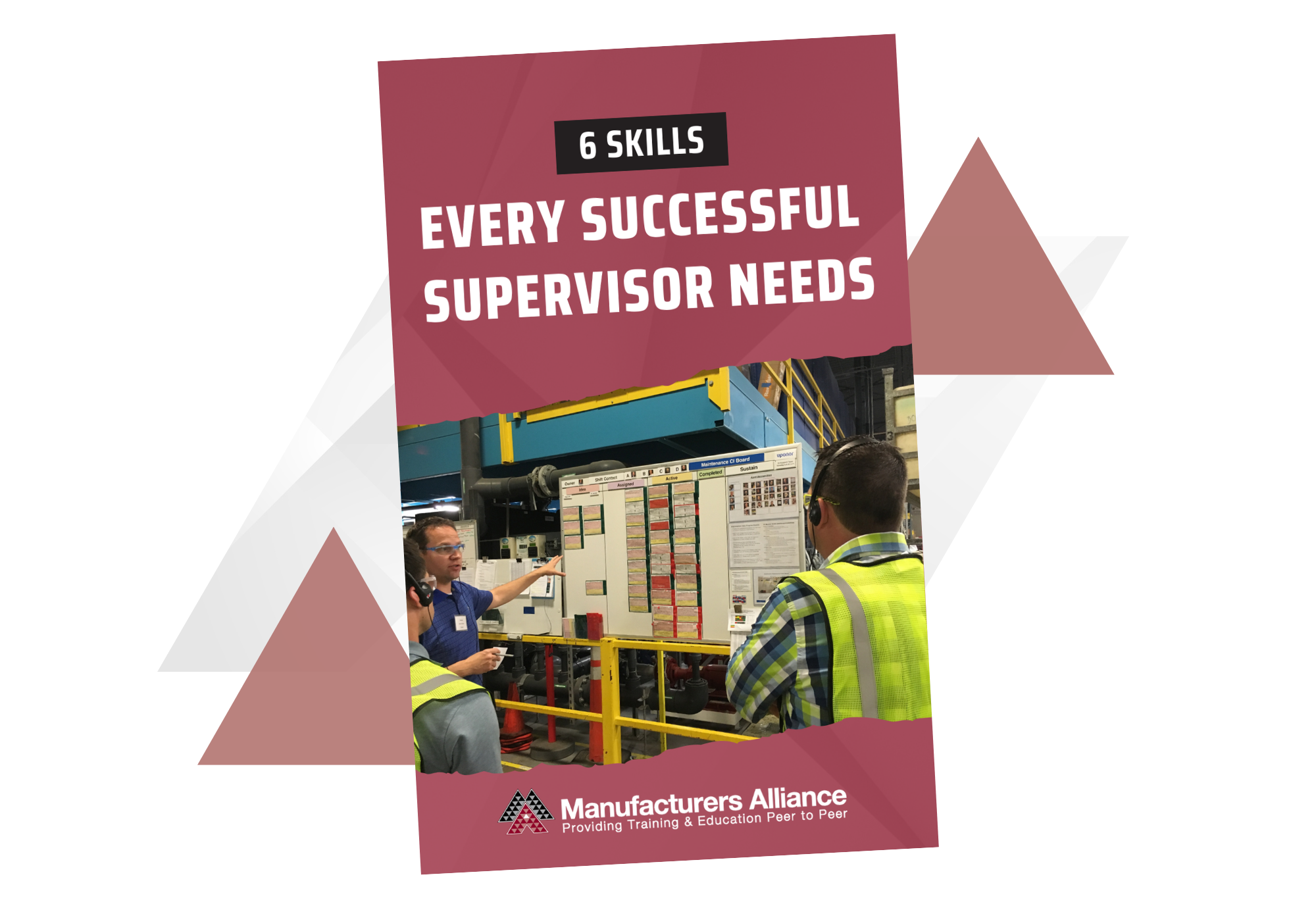
SUPERVISION FUNDAMENTALS CERTIFICATION
Learn the skills to maximize your team’s performance and cohesiveness
THIS CERTIFICATION helps you
- Improve Communication
- Enhance Cohesiveness
- Increase Retention
- Develop more trust
- Maximize Team Performance
Members: $2,250 per person
Non-members: $3,250 per person
“I have been a supervisor for 7 years and found this certification very beneficial. I highly recommend this to anyone new to supervision or those that want to brush up on their management skills. ”
Matt Armbruster, Supply Chain Director
THIS CERTIFICATION INCLUDES
6 EXPERIENTIAL WORKSHOPS + A PROJECT, TESTS & COACHING
The Role of the Leader
As a leader one needs to get work done through other people, by developing skills in effective delegation. This workshop provides participants with guidelines for delegation plus an opportunity to practice an effective assignment of a task. Participants then also learn the importance of “setting others up for success” by holding and communicating expectations for high performance.
After completing this session participants should be able to:
• Understand what skills are required for effective frontline leadership
• Recognize the importance of communications responsibilities and self-management
• Avoid “traps” that front-line leaders can easily run into
• Make better decisions about which work assignments to complete or delegate
• Effectively communicate expectations when delegating (setting others up for success)
• Foster buy-in to new ideas and change using techniques to prepare, present and sell
• Overcome resistance to change by being prepared for emotional objections
• Take steps to build their personal trustworthiness and credibility as a leader
Leadership Style and Versatility
Leadership means getting work done by influencing other people. Research shows that the most effective leader-managers have developed a specific set of influence skills: in Style Awareness and Versatility. During this program they learn about the strengths and potential blind spots of their own style and that of others. They also learn to identify other people’s styles and how to adjust their style to relate more comfortably with others. A focus is placed on applying understanding of style differences and versatility to issues of supervision and leadership.
After completing this workshop participants should be able to:
• Identify two basic behaviors which create differences in social style/communication style
• Learn about four basic communication styles and their behavioral cues
• Recognize the strengths and potential blind spots of each style
• Adapt behavior to reduce tension and work effectively with others
• Apply understanding of style and versatility skills to supervision and leadership
• Use these new skills to work best with co-workers, managers, customers and suppliers
Conflict, Communication and Collaboration
Communicating and managing conflict are among the most important and challenging jobs of leaders. Participants become more aware of conflict management strategies and when each of them might be appropriate. Participants learn techniques for effectively raising issues with others and how to respond to defensive reactions. They also have the opportunity to practice collaboration skills (i.e. win-win problem solving and principled negotiation) through one-on-one skill practices and small group exercises.
After completing this session participants should be able to:
- Prevent unnecessary/unproductive conflict at work through effective communications
- Create an open communications environment
- More consciously select the appropriate conflict management strategy to use
- Effectively raise an issue with an employee, a co-worker or even their own manager
- Respond to defense mechanisms and demonstrate active listening skills
- Take a collaborative (interest-based/win-win) approach to resolving conflict
- Mediate conflict between co-workers when necessary
Employee Performance Management and Coaching
Participants are introduced to an Employee Success Assurance Model, and tools for carrying out on-the-job training with structured checklists and job aids. They will practice setting goals, communicating clear expectations and constructive feedback. Tools for recognizing high performance are provided, along with low-cost means for rewarding employees. Participants will identify causes of performance problems and learn new coaching strategies for attendance and attitude issues. Likewise, guidance is provided for conducting coaching conversations and annual performance appraisals.
After completing this workshop, participants should be able to:
- Plan for and conduct structured on-the-job training with employees
- Provide clear expectations and goals for successful job performance
- Sustain improved job performance through feedback and recognition
- Identify obstacles to performance and job satisfaction
- Plan, conduct and document employee coaching to address performance problems, work habit issues and employee performance appraisals
Maximizing Team Performance
Participants will learn both what gets in the way of teamwork, and what fosters teamwork. Exercises demonstrate how to align people around common goals, and clarify roles among team members. Participants learn how to build an environment that fosters creativity from all team members. Tools are provided for soliciting feedback from their teams on how well they are performing, and each student is encouraged to create an Action Plan for improvement.
After completing this Workshop participants should be able to:
- Assess the effectiveness of a work team and have ideas for improvement
- Utilize shared goals to encourage teamwork
- Clarify team roles and responsibilities and foster effective communications
- Use shared rewards and recognition to promote and reinforce teamwork
- Know when to involve others in decisions that impact the team
- Foster productive interpersonal relations among work team members
Leading People Through Change
Today’s most successful companies are those that can change quickly. Yet, overcoming people’s natural resistance to change is challenging. If your job or assignment involves getting people to accept and move ahead with something new and different, this workshop is for you.
Topics will include:
• What’s behind typical human responses to change and how to handle not-so-apparent factors?
• The surprising but most effective ways to guide people through transitions and help them return to productive, committed work.
• A roadmap of steps and activities to guide people through transitions at work.
• Ways to support and encourage movement toward the goals and purpose of change at work.
+ A Project, Tests, and Coaching
Certification Project: All certification applicants are required to demonstrate their ability to apply what they learn by completing one project. This project must include positive measurable results that benefit the company.
Certification Tests: All certification applicants are required to complete a test after each workshop. Each test is approximately 15 multiple choice questions and is intended to help everyone speak the same language. Tests are open book and can be taken multiple times.
Certification Coaching: All certification applicants are required to complete a Learning to Solve Problems coaching session. During coaching you will learn how to be successful from project set-up to completion, recognize and mitigate bias, objectively define problems, learn where, how and when to access resources, and apply the Project Template as a project management tool.
Non-members: $3,250 per person
meet a few of our
Experienced Instructors
Susan Lacasse
Susan LaCasse knows firsthand the challenges of creating a culture of continuous improvement and the leadership that significant culture change demands. Susan brings 25 years experience in driving change in a variety of project and leadership roles, including twice as an original “lean team” member.

Natalie Ackerman
Natalie has helped thousands of leaders over the last 14+ years learn skills and mindsets to become more effective and to reach their leadership potential. She has worked with manufacturing leaders at every level across a variety of sectors including industrial, food, precision machining, metal fabrication, and aerospace.

Jim Doyle
Jim Doyle blends his 25 years of experience and passion to help manufacturing leaders grow and achieve their goals. His experience working with team leads, plant managers, and executives has been applied to improve communication across shifts, increase employee engagement and more clearly define strategic issues and opportunities.

THE PROCESS TO BECOME CERTIFIED
-
 Step 1
Step 1
Enroll in Certification
-
 Step 2
Step 2
Complete training
-
 Step 3
Step 3
Apply what you learn
-
 Step 4
Step 4
Get better results
SELECT A FORMAT THEN
ENROLL IN A CERTIFICATION


Live Online
Starts September 23, 2025
Members $2,250
Non-members $3,250
Schedule

Custom
We customize training to fit your team needs, timeline, and improvement plans.

Want to know about upcoming certification dates?

Frequently Asked Questions
What is the time commitment?
Workshops, tests, and project work may be completed in 6-12 months
Who is this certification for?
Manufacturing, Industrial, and Quality Engineers, and Department Leads or Supervisors
What types of projects will participants complete?
Click here to view a real-world project
Who do I contact to learn more about this certification?
Email our Member Services Manager, Monica at monicas@mfrall.com
GET THE FREE BOOKLET on
6 Skills Every Successful Supervisor Needs

